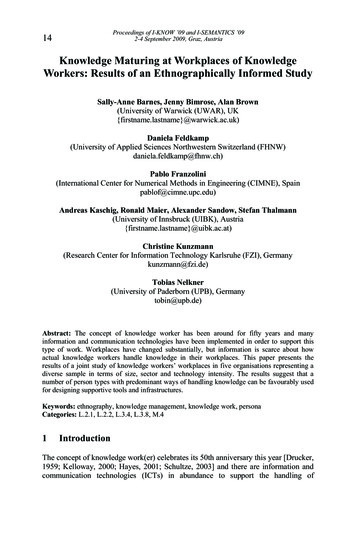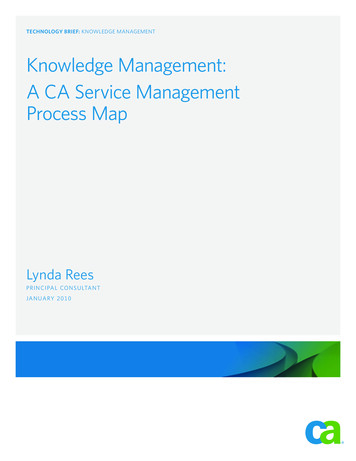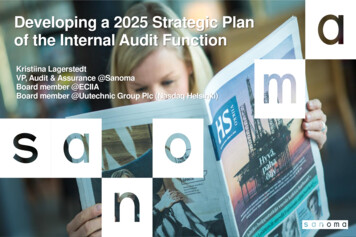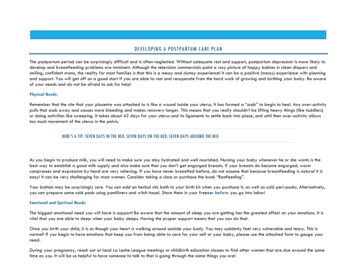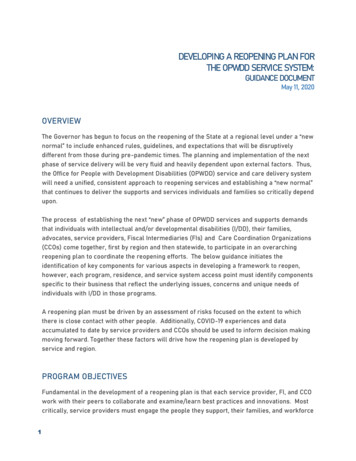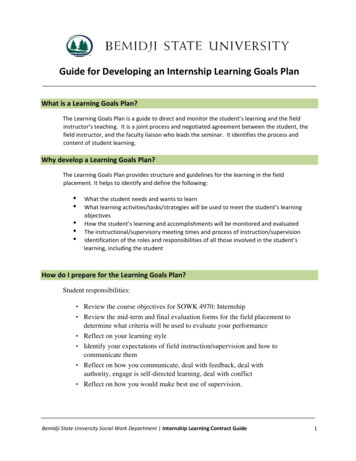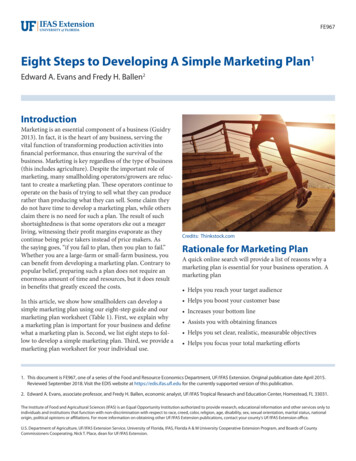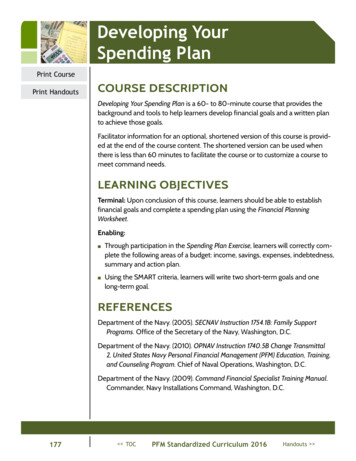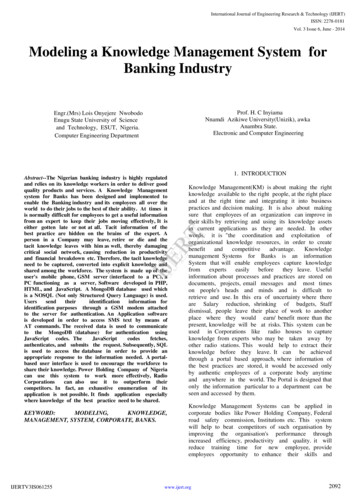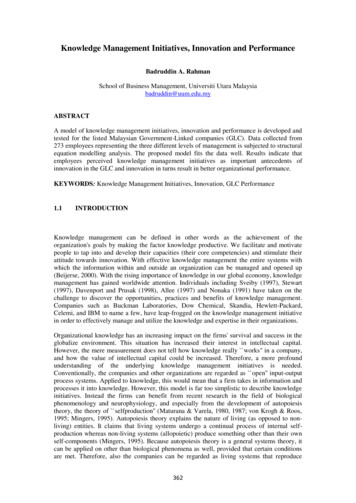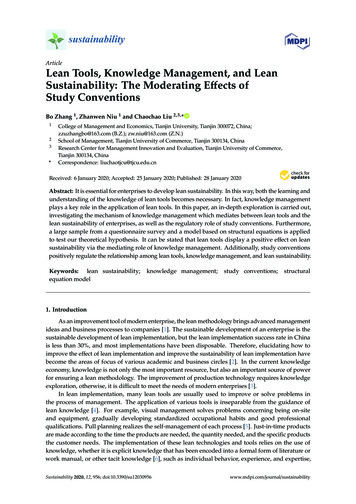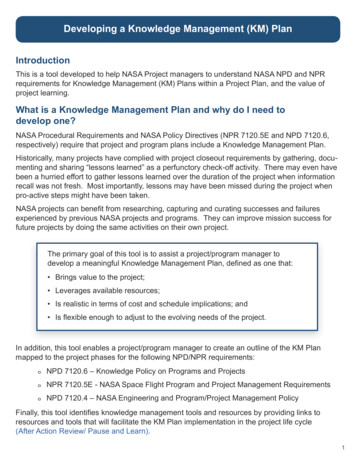
Transcription
Developing a Knowledge Management (KM) PlanIntroductionThis is a tool developed to help NASA Project managers to understand NASA NPD and NPRrequirements for Knowledge Management (KM) Plans within a Project Plan, and the value ofproject learning.What is a Knowledge Management Plan and why do I need todevelop one?NASA Procedural Requirements and NASA Policy Directives (NPR 7120.5E and NPD 7120.6,respectively) require that project and program plans include a Knowledge Management Plan.Historically, many projects have complied with project closeout requirements by gathering, documenting and sharing “lessons learned” as a perfunctory check-off activity. There may even havebeen a hurried effort to gather lessons learned over the duration of the project when informationrecall was not fresh. Most importantly, lessons may have been missed during the project whenpro-active steps might have been taken.NASA projects can benefit from researching, capturing and curating successes and failuresexperienced by previous NASA projects and programs. They can improve mission success forfuture projects by doing the same activities on their own project.The primary goal of this tool is to assist a project/program manager todevelop a meaningful Knowledge Management Plan, defined as one that: Brings value to the project; Leverages available resources; Is realistic in terms of cost and schedule implications; and Is flexible enough to adjust to the evolving needs of the project.In addition, this tool enables a project/program manager to create an outline of the KM Planmapped to the project phases for the following NPD/NPR requirements:ᴑNPD 7120.6 – Knowledge Policy on Programs and ProjectsᴑNPR 7120.5E - NASA Space Flight Program and Project Management RequirementsᴑNPD 7120.4 – NASA Engineering and Program/Project Management PolicyFinally, this tool identifies knowledge management tools and resources by providing links toresources and tools that will facilitate the KM Plan implementation in the project life cycle(After Action Review/ Pause and Learn).1
Developing a Knowledge Management (KM) PlanWhat are the specific compliance requirements for the NPR and NPDs?2
Developing a Knowledge Management (KM) PlanThe “Meaningful” Knowledge Management PlanA meaningful KM Plan which can enhance project success by learning from past projects’successes and failures includes three learning components. A template is available at the end ofthis document that can be used as a guide for the types of learning activities (hosting knowledgesharing forums, accessing NASA’s Lessons Learned Information System (LLIS), attendingknowledge sharing forums, hosting a facilitated learning session such as a Pauseand Learn (PaL), and reading case studies to consider during the life cycle of the project.Putting Together Your KM PlanWho can help me with putting together a KM Plan?In accordance with NASA Policy Directive 7120.6,every NASA center and mission directorate has anappointed Chief Knowledge Officer (CKO) who canbe a helpful resource to consult when developingthe KM Plan. The CKO can help you map out theactivities to encourage project learning, and help theproject team master successes and avoid mistakesthat previous projects experienced. The CKO canalso facilitate capturing knowledge and lessonsfrom your project to assist future team success.Getting StartedContact your center or missiondirectorate CKO to learn more abouttools and resources for writingyour KM Plan.The project manager is ultimately responsible forimplementation of the Knowledge Management Planand should delegate responsibilities for specificactivities within the Knowledge Management Plan,such as: Who will be responsible for scheduling andorganizing Pause and Learn sessions, gatheringlessons learned, documenting case studies, andcommunicating with leadership? Who will be responsible for learning from other projects? If the responsibility is shared across the project, make it as specific as possible.3
Developing a Knowledge Management (KM) PlanGoddard Space Flight Center’s (GSFC) Office of the Chief Knowledge Officer (OCKO) created aframework for its flight project teams that involves embedding existing knowledge managementactivities, such as Pause and Learn sessions, case studies, and workshops, within project plans.Carrying out these activities during projects—in the moment—helps ensure that memoriesof events are fresh and the lessons they provide can be put to use immediately. The first andprimary beneficiary of any lessons learned activity should be the project team itself, but theseactivities also support learning across projects.4
Developing a Knowledge Management (KM) PlanProject Knowledge Capture, Curation and SharingWhat kinds of activities should I consider including in my Knowledge Management Plan?In order to create your KM Plan for capturing knowledge and lessons learned, start by schedulinga meeting with the CKO at your center or mission directorate to learn about the variety of toolsand resources that can be used to help you build your KM Plan. In your meeting, you can decidetogether on the type of activities to be implemented in the formulation, implementation andproject closeout phases. The examples below are a sampling of the options that can be includedin your KM plan, but are not meant to be prescriptive.Formulation Phase(Learn from Other Projects)Implementation Phases(Learn within the Project)Be aware of and follow existing rulesand established processes and guidance (GOLD rules, tech standards, etc.),which have lessons and knowledge fromprevious projects embedded in them.Continue to access relevant projectlessons learned via your local/centeror agency lessons learned information systems (LLIS), by talking to otherproject/program managers, and byreading case studies from other projects.Access previous project lessons learnedvia your local/center or agency lessonslearned information systems (LLIS) bytalking to other project/program managers, and by reading case studies fromother projects.Attend knowledge sharing workshops,training and case study sessionsorganized by OCKO and other center/mission directorate host organizations.Request a knowledge sharing workshoptailored to the needs of your project.This can be designed with the CKO.Consult other sources of LessonsLearned and Guidance: NASA Engineering Network Communities of Practice,Mishap Reports, APPEL KnowledgeServices’ Critical Knowledge Gateway(CK Gateway), Masters with Mastersvideos and other NASA YouTubelessons learned videos.Lessons learned need to be identifiedand documented on a regular basisrather than only at the end of the project/program. Specifically, lessons learnedneed to be identified and documentedat the end of each project/program lifecycle phase. The activity should beundertaken soon after the gate reviews.Team members should discusslessons learned during peerreviews in early design phase.In addition to documenting lessonslearned, consider documenting insights and things you think other projects might benefit from throughoutthe project at regular intervals. Turnthose notes into knowledge maps andintegrate them into the center/missiondirectorate and/or agency LLIS.Consider whether Pause and Learnsessions (also known as After ActionReviews) or other types of activities can help your team learn fromthe current state of the project,share lessons with others, and redirect a project or team members asa result of the session outcomes.Project Closeout(Share Project Lessons)Within 60 days of launch, the projectmanagement team (with support fromthe OCKO), should consolidate projectlessons learned into a final lessonslearned report. The lessons should beentered into the LLIS, and the reportcan be shared with other people.Beyond the dissemination of officiallessons learned through the LLIS, theproject should share project knowledgeby collaborating with the OCKO todevelop one or more case studies andhold a knowledge sharing workshop.Within 60 days after the mission’slaunch, the project can consider scheduling and holding a knowledge sharingworkshop with the support of the CKOto tell others about the mission and thekey lessons learned from the mission.If case studies have been developed,they may serve as the basis for sucha knowledge sharing workshop.Within 90 days after the mission’slaunch, a member of the project teamwill contact APPEL Knowledge Services to co-develop an article on theproject and lessons learned. The articlewill be published on appel.nasa.gov.5
Developing a Knowledge Management (KM) PlanNASA and Center Level Resources NASA Policy Directive (NPD) 7120.6 - Knowledge Policy on Programs and Projects NASA Procedural Requirement (NPR) 7120.5E - NASA Space Flight Program and ProjectManagement Requirements Office of the Chief Knowledge Officer (OCKO) at Centers and Mission Directorate CKOs NASA Lessons Learned Information Systems Pause and Learn Brochure Pause and Learn Implementation Guide (in the FPD Knowledge Exchange) Case Study MethodologyTo get a Template to help you write your KM plan, contact Susan Snyder, APPEL KS KnowledgeLead: sbsnyder@asrcfederal.comSpecial credit for KM Plan tool content goes to NASA Goddard Space Flight Center (GSFC)Center Office of the Chief Knowledge Office (OCKO) and Barbara Fillip, former Knowledge Lead,Flight Projects Directorate, ASRC Federal/Inuteq, LLC.6
Finally, this tool identifies knowledge management tools and resources by providing links to resources and tools that will facilitate the KM Plan implementation in the p
